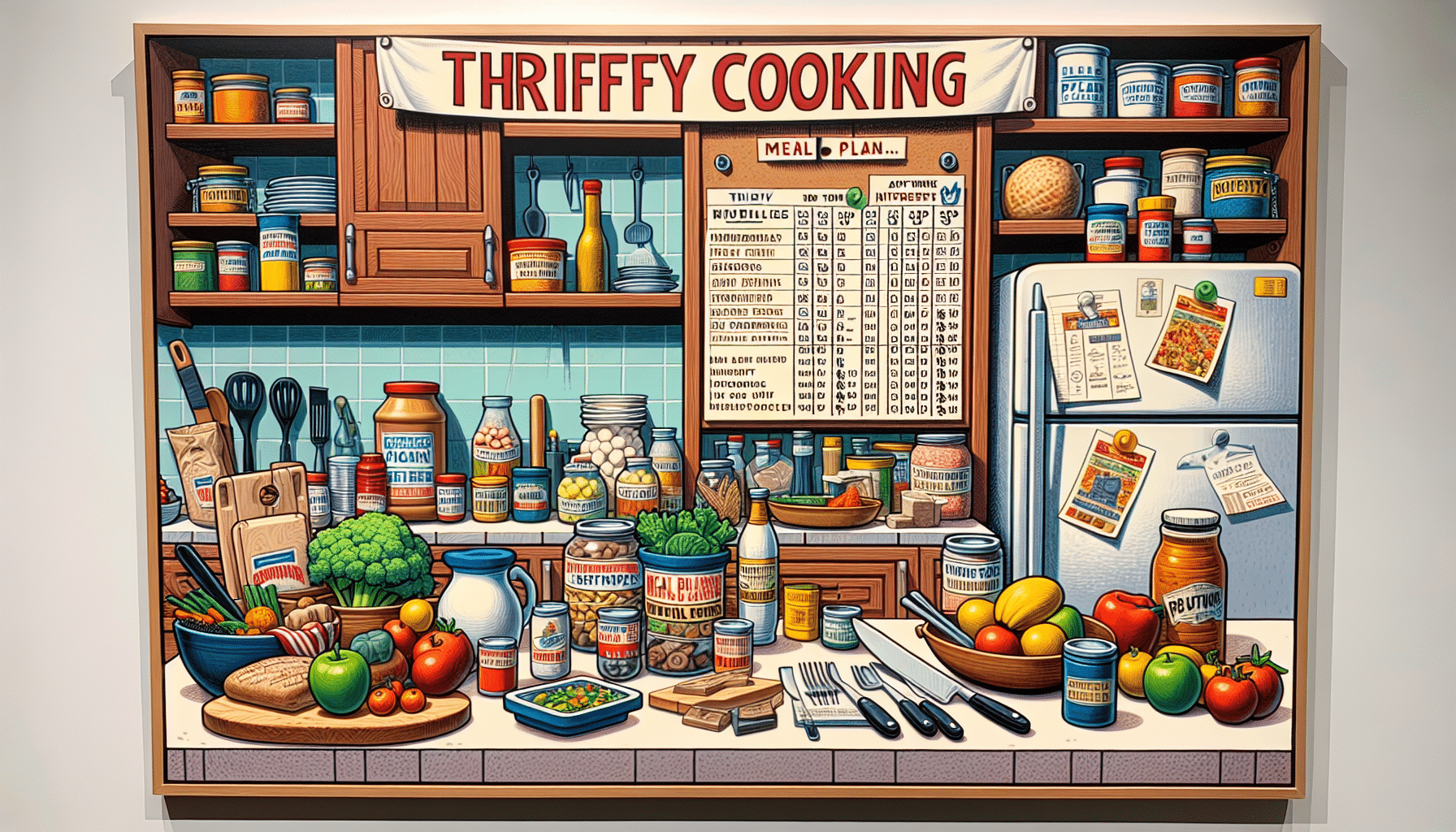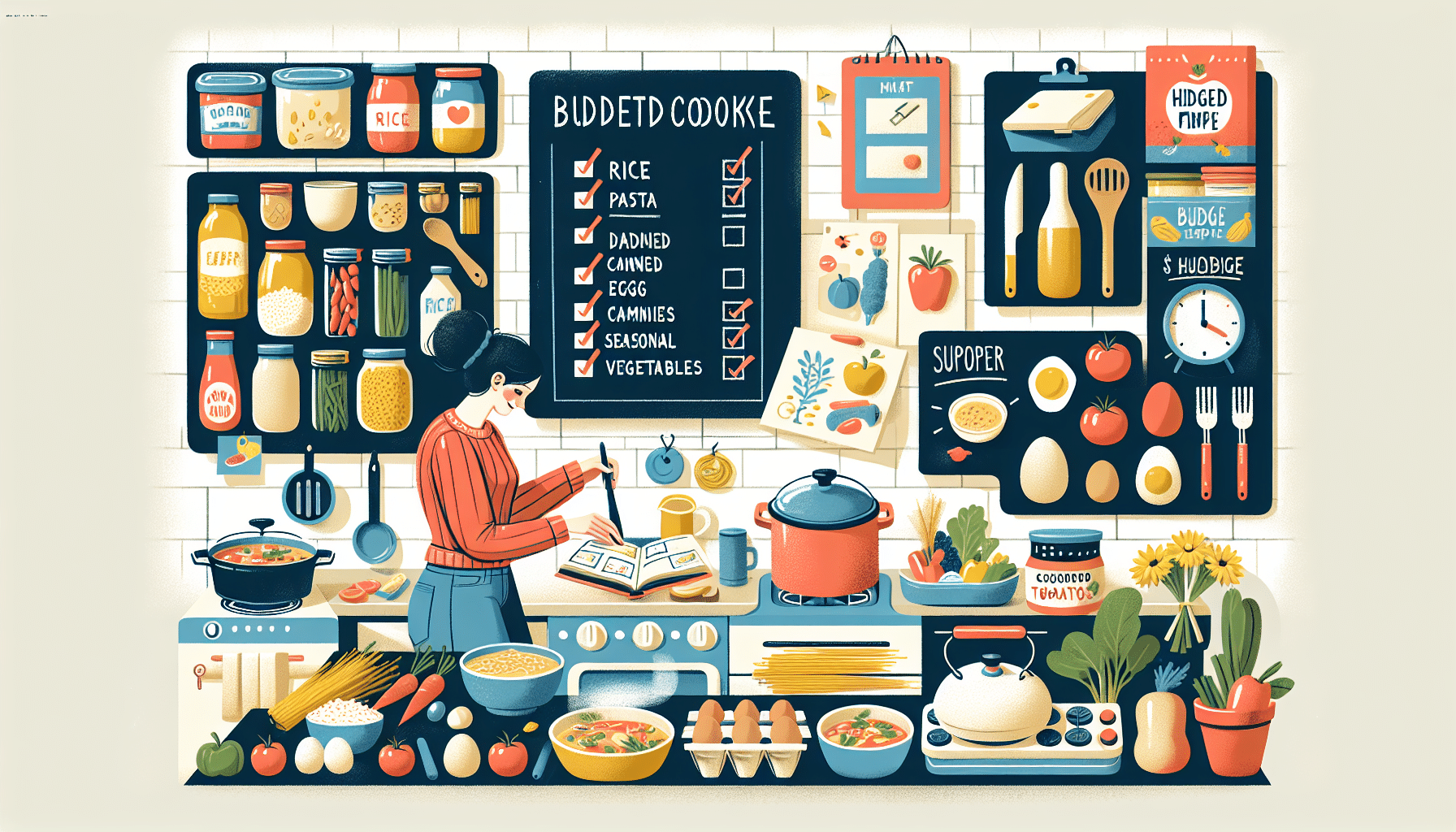If you're tired of spending a fortune on dining out and are craving a more budget-friendly alternative, then look no further. In this article, we'll explore the art of saving money on food while still indulging in culinary delights. By starting with quality ingredients, planning your meals ahead, and paying attention to presentation, you can elevate your cooking skills and create gourmet meals from the comfort of your own kitchen. Not only will this lead to a healthier and more balanced diet, but it can also open up new learning opportunities and even become a lucrative side hustle. Get ready to discover how cooking at home can save you money and bring your community together.
1. Plan Your Meals

1.1 Create a Weekly Meal Plan
Planning your meals ahead of time is essential for saving money and avoiding food waste. By creating a weekly meal plan, you can make a list of all the ingredients you need and eliminate the need for spontaneous and expensive grocery store trips. Take some time each week to sit down and plan your meals, considering your schedule, dietary preferences, and any ingredients that are already in your pantry. This way, you can ensure that you have everything you need to prepare delicious and budget-friendly meals throughout the week.
1.2 Use Leftovers for New Meals
One of the best ways to save money on food is by repurposing leftovers. Instead of throwing away any uneaten food, get creative and turn them into new meals. For example, leftover roasted chicken can be transformed into a flavorful chicken salad or used as a filling for tacos. Leftover vegetables can be turned into a delicious stir-fry or added to a hearty vegetable soup. By using leftovers wisely, you not only save money but also reduce food waste.
1.3 Cook in Batches and Freeze for Later
Another smart way to save money and time is by cooking in batches and freezing meals for later. When you have a busy schedule and limited time for cooking, preparing meals in advance can be a lifesaver. Choose recipes that freeze well, such as soups, stews, casseroles, and sauces, and make a larger quantity than you need for one meal. Divide the leftovers into individual portions and freeze them for future use. This way, you always have a delicious and homemade meal ready to go, eliminating the need for expensive takeout on hectic days.
2. Shop Smart
2.1 Make a Shopping List and Stick to It
One of the most effective ways to save money on groceries is by making a shopping list and sticking to it. Before heading to the store, take inventory of the ingredients you already have and plan your meals for the week. Based on your meal plan, create a detailed shopping list and only buy the items on your list. Avoid impulse purchases and tempting displays by staying focused and disciplined. By having a clear plan and sticking to it, you can avoid unnecessary spending and stay within your budget.
2.2 Buy in Bulk
Buying in bulk can significantly reduce your grocery expenses over time. Many staple pantry items, such as rice, pasta, beans, and spices, are often cheaper when purchased in larger quantities. Look for bulk sections in your grocery store and consider investing in storage containers to keep your bulk purchases fresh and organized. By buying in bulk, you not only save money but also reduce packaging waste, making it an environmentally-friendly choice.
2.3 Compare Prices and Look for Sales
To get the most bang for your buck, take the time to compare prices and look for sales. Different grocery stores may have varying prices on the same products, so it's worth checking out multiple options. Take advantage of weekly flyers, coupons, and loyalty programs to score discounts on your favorite items. Additionally, consider shopping at local farmers' markets or joining a community-supported agriculture (CSA) program to access fresh and affordable produce. By being a savvy shopper, you can save money and support local farmers.
3. Choose Budget-Friendly Ingredients

3.1 Opt for Seasonal Produce
When trying to eat on a budget, choosing seasonal produce is a smart move. Seasonal fruits and vegetables are often more abundant and therefore cheaper compared to out-of-season produce that needs to be transported from far away. Take advantage of what's in season and build your meals around these ingredients. Not only will you save money, but you'll also enjoy the freshest and most flavorful produce available.
3.2 Buy Generic or Store Brands
Another way to cut costs on groceries is by buying generic or store brands. Many generic or store-brand products are comparable in quality to their name-brand counterparts but come at a lower price. Take the time to compare labels and ingredients to ensure that you're getting a similar or even identical product for a lower price. By opting for generic options, you can significantly reduce your grocery bill without sacrificing taste or quality.
3.3 Incorporate Vegetarian or Vegan Dishes
Meat can be one of the most expensive components of a meal. By incorporating more vegetarian or vegan dishes into your meal plan, you can save a significant amount of money. Plant-based proteins, such as beans, lentils, tofu, and tempeh, are usually much cheaper than animal-based proteins. Explore delicious vegetarian and vegan recipes that are both budget-friendly and packed with nutrients. Embracing meatless meals not only saves you money but also supports a more sustainable and environmentally-friendly way of eating.
4. Cook from Scratch

This image is property of images.unsplash.com.
4.1 Avoid Prepackaged and Processed Foods
Prepackaged and processed foods may be convenient, but they often come with a higher price tag. Instead of relying on these expensive convenience foods, make an effort to cook from scratch as much as possible. By preparing your meals using fresh ingredients, you have more control over the flavors, nutrition, and cost. Cooking from scratch allows you to create healthier and more delicious meals while saving money in the long run.
4.2 Make Homemade Stocks and Sauces
Stocks and sauces are essential building blocks of many recipes, but store-bought versions can be pricey. Instead of buying pre-made stocks and sauces, consider making them from scratch. By using leftover vegetable scraps, meat bones, or herbs, you can create flavorful stocks that add depth to your soups and stews. Homemade sauces, such as tomato sauce or pesto, are also cost-effective and allow you to customize the flavors to your liking.
4.3 Bake Your Own Bread and Pastries
Bread and pastries from bakeries can be quite expensive, especially if you consume them regularly. Instead of buying these items, try baking your own bread and pastries at home. Making bread from scratch is a rewarding and budget-friendly endeavor. With a few basic ingredients, such as flour, yeast, water, and salt, you can create delicious loaves of bread that rival those from a bakery. The same goes for pastries like muffins, cookies, and cakes. By baking your own bread and pastries, you not only save money but also have the freedom to experiment with different flavors and ingredients.
5. Utilize Cost-Effective Cooking Techniques

This image is property of images.unsplash.com.
5.1 Slow Cooking and Pressure Cooking
Slow cooking and pressure cooking are two techniques that can help maximize flavor while minimizing cost. Slow cookers and pressure cookers are designed to cook food slowly and efficiently, allowing you to use cheaper cuts of meat and tenderize them to perfection. These cooking methods also require less energy, making them cost-effective and environmentally-friendly.
5.2 One-Pot Meals and Casseroles
One-pot meals and casseroles are not only convenient but also budget-friendly. By combining multiple ingredients in one pot or dish, you can create hearty and flavorful meals without the need for multiple cooking utensils or appliances. Choose recipes that use affordable ingredients and require minimal preparation time. These dishes are not only cost-effective but also make for easy clean-up, saving you both time and money.
5.3 Stretching Meat with Fillers and Extenders
If you're looking to make your meat go further, consider stretching it with fillers and extenders. Fillers, such as breadcrumbs, oatmeal, or grated vegetables, can be added to ground meats to increase their volume while still providing a satisfying meal. Extenders, such as beans or lentils, can be mixed with ground meats in dishes like meatballs or tacos to add bulk and reduce the overall cost. By creatively using fillers and extenders, you can enjoy meat-based dishes without breaking the bank.
6. Reduce Food Waste

This image is property of images.unsplash.com.
6.1 Properly Store and Preserve Food
Reducing food waste is not only good for your wallet but also for the environment. Properly storing and preserving food can help extend its shelf life and prevent spoilage. Invest in good-quality storage containers, vacuum sealers, and zip-top bags to keep your food fresh for longer. Learn about the proper storage techniques for different types of food, such as fruits, vegetables, meats, and leftovers. By preserving your food properly, you can avoid unnecessary waste and save money by not having to repurchase ingredients.
6.2 Use Leftovers Creatively
We've already mentioned using leftovers for new meals, but it's worth emphasizing again. Get creative with your leftovers and transform them into entirely new dishes. For example, leftover roasted vegetables can be turned into a flavorful frittata, and yesterday's chicken can be transformed into a tasty sandwich filling. By utilizing your leftovers creatively, you not only save money but also prevent them from ending up in the trash.
6.3 Compost Unused Food Scraps
Even with the best intentions, there may still be some food scraps that cannot be used. Rather than throwing them in the trash, consider starting a compost pile or bin. Composting is an eco-friendly way to dispose of food waste and turn it into nutrient-rich soil for your garden. By composting unused food scraps, you actively reduce waste and contribute to a more sustainable lifestyle.
7. Grow Your Own Food
7.1 Start a Kitchen Herb Garden
Growing your own food can be a fulfilling and cost-effective way to enhance your culinary creations. A great starting point is to grow a kitchen herb garden. Herbs like basil, thyme, parsley, and mint are easy to grow in small pots or containers. Not only do they add fresh flavors to your dishes, but they also save you money on store-bought herbs. With a bit of sunlight and water, you can have a continuous supply of aromatic herbs right at your fingertips.
7.2 Grow Vegetables and Fruits
If you have access to outdoor space, consider growing your own vegetables and fruits. Gardening allows you to harvest fresh produce at a fraction of the cost compared to buying them from the store. Choose vegetables and fruits that are easy to grow in your specific climate and take into account the space and sunlight requirements. From tomatoes and peppers to lettuce and strawberries, there is a wide variety of fruits and vegetables that can thrive in home gardens. Not only will you save money by growing your own food, but you'll also have the satisfaction of enjoying the fruits of your labor.
7.3 Utilize Windowsill Gardening
If you don't have access to a yard or outdoor space, don't worry! You can still grow some of your own food using windowsill gardening. Many herbs, such as chives, parsley, and rosemary, can be grown in small pots or containers on your windowsill. Additionally, some compact vegetables, like cherry tomatoes and miniature peppers, are well-suited for indoor growing. All you need is a sunny window and some basic gardening supplies, and you can enjoy the benefits of fresh, homegrown produce.
8. Try Ethnic Cuisines
8.1 Explore Budget-Friendly Ethnic Recipes
Ethnic cuisines are often a treasure trove of delicious and budget-friendly recipes. From Mexican tacos to Indian curries to Chinese stir-fries, the world is full of culinary delights that won't break the bank. Explore different cuisines and try out budget-friendly recipes that use affordable ingredients commonly found in these cultures. By diversifying your meals and experimenting with new flavors, you can enjoy exciting and satisfying meals on a budget.
8.2 Experiment with Spices and Condiments
Spices and condiments are an excellent way to elevate your dishes without spending a lot of money. Instead of purchasing expensive pre-made sauces and spice blends, invest in a basic set of spices and experiment with different combinations. By adding herbs, spices, and condiments to your meals, you can transform simple ingredients into flavorful masterpieces. Don't be afraid to get creative and try new flavor combinations to make your dishes truly unique.
8.3 Learn to Make International Staples
Many international staples, such as bread, pasta, and sauces, can be easily made at home for a fraction of the cost of store-bought versions. Instead of purchasing pre-packaged pasta, try your hand at making homemade pasta from scratch. Similarly, bread and sauces like marinara or salsa can be made with a few simple ingredients. By learning to make these staples yourself, you not only save money but also gain new culinary skills and expand your repertoire of delicious recipes.
9. Swap Eating Out for Cooking Gatherings
9.1 Organize Potluck Dinners
Instead of going out to eat with friends or family, consider organizing potluck dinners. Potluck dinners are a fantastic way to share the cost and effort of cooking while enjoying a variety of delicious dishes. Each participant can bring a homemade dish or contribute specific ingredients, making it a fun and budget-friendly social gathering. Not only will you save money by dining in, but you'll also have the opportunity to showcase your cooking skills and try different dishes prepared by others.
9.2 Host Cooking Parties
Host your own cooking parties and invite friends or family to join in the fun. Choose a theme, such as pizza night or sushi-making, and have everyone contribute to preparing the meal. By cooking and enjoying the meal together, you not only save money but also create lasting memories and strengthen your relationships. Hosting cooking parties allows you to create a sense of community while exploring new recipes and techniques together.
9.3 Join Local Cooking Clubs or Classes
If you want to expand your cooking skills and meet like-minded individuals, consider joining local cooking clubs or taking cooking classes. Many communities offer cooking clubs or classes that focus on specific cuisines or cooking techniques. By joining these groups, you can learn from experienced cooks, share ideas, and gain inspiration for budget-friendly meals. Additionally, cooking clubs and classes often provide an opportunity to share the cost of ingredients, making it a more affordable way to explore new recipes.
10. Embrace Minimalism in the Kitchen
10.1 Invest in Essential Kitchen Tools
Having a well-equipped kitchen doesn't mean you need every gadget and appliance on the market. Instead, invest in essential kitchen tools that will serve multiple purposes and last a long time. Quality knives, a cutting board, a set of measuring spoons and cups, a mixing bowl, and a few versatile pots and pans are essential for most cooking tasks. By avoiding unnecessary kitchen gadgets, you not only save money but also minimize clutter and simplify your cooking process.
10.2 Declutter and Organize Your Pantry
A cluttered and disorganized pantry can lead to food waste and unnecessary spending. Take the time to declutter and organize your pantry and refrigerator, making it easier to see what ingredients you have on hand. Properly labeling containers and arranging items by category can help you locate ingredients quickly and prevent them from expiring unused. By maintaining an organized pantry, you can save money by avoiding duplicate purchases and utilizing ingredients before they go bad.
10.3 Simplify Your Cooking Techniques
Cooking impressive meals doesn't always require complex techniques. Simplify your cooking techniques by focusing on quality ingredients, proper seasoning, and thoughtful presentation. Simple dishes, such as a perfectly roasted chicken or a flavorful pasta dish, can be just as satisfying as elaborate meals. By mastering the basics and simplifying your approach, you can create delicious and memorable dishes without spending hours in the kitchen or breaking the bank.
In conclusion, mastering the art of elevated cooking on a budget is entirely possible. By following these tips, you can save money, reduce food waste, and enjoy delicious homemade meals. Remember to plan your meals, shop smart, choose budget-friendly ingredients, cook from scratch, utilize cost-effective cooking techniques, reduce food waste, grow your own food, explore ethnic cuisines, swap eating out for cooking gatherings, and embrace minimalism in the kitchen. Enjoy the process of cooking, and savor the flavors of your budget-friendly creations. Bon appétit!

